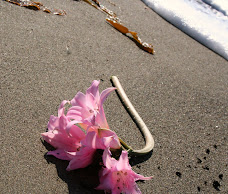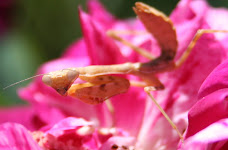The colony of acorn woodpeckers that lives in the three oaks next to my house is worth telling about. Since we're next-door neighbors and the birds live their lives in the open, I've learned some of their habits by observation. What I've seen has driven me to bird books, for which I thank my grandfather and my mother, and possibly their grandfathers too, because I've read that reading is a learned behavior.
Both my mother and my Granddad carried nature-identification books into the forests and deserts we visited, and I remember the pair of them, sometimes with my aunt or uncles, poring over the guide books at picnic tables, laboriously trying to identify--by studying the minute features of it--some particular tree or bird or flower. They could spend what seemed like hours doing this. And some of the family still can't visit nature, or even our back yards sometimes, without hauling out the reference books and binoculars.
The acorn woodpecker excited the last nature discussions I remember having with Mom and family members. We're fortunate here in the oak woodlands to have these birds; their range is small, and from what my books tell me, they seem unique among woodpeckers. Both males and females wear a red cap and a black and white tuxedo, and they're exceedingly busy in the fall with their acorn harvest.
One of my three oaks is what's called a granary tree: This one large oak is where they store their harvest, in holes peppered all up and down the length of the tree's trunk and arcing out into its branches. It looks like this:
 |
| The woodpeckers in my oaks are great stewards of their resources. |
The wonderful thing, the unique thing, about these woodpeckers is their community. They live as a colony in these three trees. Everyone harvests, everyone works hard poking acorns into well-worn holes, everyone helps. They share in the work, and they share in the bounty. We wondered if they harvest grubs that might grow in the stored acorns, but the books say they dine all year on acorns themselves (with insects as a side dish), stored meticulously in the granary tree, in holes that are reused and carefully selected for each individual acorn.
 |
| Lunch menu: Would you like it roasted, or perhaps in a wrap? |
They even cooperate in raising their young, from sharing the duties of incubating the eggs to sharing the endless chore of feeding the young and, finally, training them to fly. The young belong to everyone.
I have seen this colony of woodpeckers work together also to fend off an onslaught of starlings that appeared one day earlier this year. The woodpeckers unified to protect their interest in the three oaks. Even though the numbers of starlings and woodpeckers seemed about even, after several hours of strategic swooping and chattering, the woodpeckers convinced the starlings to set up house elsewhere.
Together they protect their habitat. They are a sustainable community, taking care of their land and resources, reusing the same holes year after year. They diversify by consuming crops from different varieties of oaks, and they maintain emergency supplies, living on nature's bounty of insects when that "crop" is available.
They share in the rearing of their offspring, cooperating in raising up a new brood of responsible woodpeckers and sending them off to find new communities elsewhere, thus keeping their population stable and not overtaxing their resources.
It appears to me that the acorn woodpeckers illustrate the life of a good community. I hope my community's leaders make decisions that use our resources well and protect our habitat. I hope the spirit of cooperation flourishes in the state, national, and global level, that we and our leaders all work hard to be good stewards and share the bounty of our efforts with those less fortunate than we are.
The best I can do to make that happen is to bring such a spirit with me into this one day, today, and be alert with the people who come across my path this day, then keep on doing that, one day at a time.
It's easy, as one of the "99 percent," to feel overwhelmed, ignored, and powerless. But I fight to believe that my actions, my mindfulness, in the small sphere of my daily life makes a difference one human being at a time, one day at a time. I believe in the ripples in the pond: that my responsible, kind, thoughtful actions with the people I meet are used by the Creator to spread to others, in the same way they were passed on to me. May God bless us, every one, with an awareness of the small, but global, ripple effect of our personal actions in this new year.
 |
Acorn Woodpecker courtesy Wikipedia
Just to prove I don't sit around all the time pondering nature and serious social issues, here is a recent poem inspired by these birds:
Two Woodpeckers Sitting on a Church Steeple
One woodpecker says to the other,
I’ve lost my pecker.
The second woodpecker says to the first,
It’s hanging there right under your nose, dude.
The first woodpecker says,
That’s not my pecker, idiot, that’s my beak.
They look at each other.
The second woodpecker says to the first,
Well, where’s your pecker then?
The first woodpecker says,
If I knew that, my pecker wouldn’t be lost.
They look at each other.
The sun goes down behind the steeple.
Top photo credit: Victory Dance and Family Feast, courtesy ShareTheRoad Productions |


















